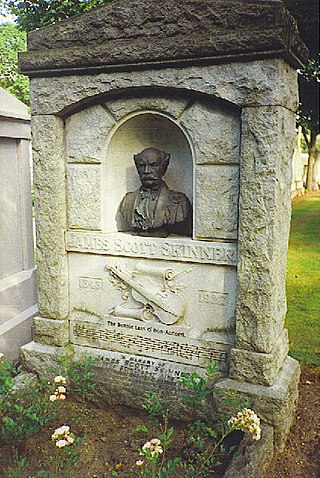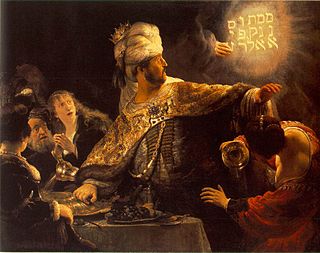Related Research Articles

Lokasenna is one of the poems of the Poetic Edda. The poem presents flyting between the gods and Loki. It is written in the ljóðaháttr metre, typical for wisdom verse. Lokasenna is believed to be a 10th-century poem.
In Greek mythology, Zelus or Zelos was the daimon that personifies dedication, emulation, eager rivalry, envy, jealousy, and zeal. The English word "zeal" is derived from his name.

James Scott Skinner was a Scottish dancing master, violinist, fiddler and composer. He is considered to be one of the most influential fiddlers in Scottish traditional music, and was known as "the Strathspey King".

Belshazzar's Feast is a cantata by the English composer William Walton. It was first performed at the Leeds Festival on 8 October 1931, with the baritone Dennis Noble, the London Symphony Orchestra and the Leeds Festival Chorus, conducted by Malcolm Sargent. The work has remained one of Walton's most celebrated compositions. Osbert Sitwell selected the text from the Bible, primarily the Book of Daniel and Psalm 137. The work is dedicated to Walton's friend and benefactor Lord Berners.

Major-General Sir Hector Archibald MacDonald,, also known as Fighting Mac, was a British Army soldier.

Psalm 89 is the 89th psalm of the Book of Psalms, beginning in English in the King James Version: "I will sing of the mercies of the LORD for ever". In the slightly different numbering system used in the Greek Septuagint and Latin Vulgate translations of the Bible, this psalm is Psalm 88. In Latin, it is known as "Misericordias Domini in aeternum cantabo". It is described as a maschil or "contemplation".
"Wyoming" is the state song of Wyoming. Judge Charles Edwin Winter (1870–1948) wrote the words during the summer of 1903, and Earle R. Clemens (1878–1943) wrote music to it soon thereafter. They copyrighted the song in 1913 and the Wyoming Publishing Company in Casper published it that same year and the song became the unofficial Wyoming state song. Clemens was a newspaper editor for the Grand Encampment Herald, the newspaper of Grand Encampment, Wyoming.

Keening is a traditional form of vocal lament for the dead in the Gaelic Celtic tradition, known to have taken place in Ireland and Scotland. Keening, which can be seen as a form of sean-nós singing, is performed in the Irish and Scottish Gaelic languages.

Jephtha is an oratorio (1751) by George Frideric Handel with an English language libretto by the Rev. Thomas Morell, based on the story of Jephtha in Judges and Jephthes, sive Votum (1554) by George Buchanan. Whilst writing Jephtha, Handel was increasingly troubled by his gradual loss of sight, and this proved to be his last oratorio. In the autograph score, at the end of the chorus "How dark, O Lord, are thy decrees" he wrote "Reached here on 13 February 1751, unable to go on owing to weakening of the sight of my left eye."

Duncan MacGregor Crerar was a Scottish poet who spent much of his adult life in western Ontario and New York City, writing sentimental poetry commemorating places and friends in Scotland. A native Gaelic speaker, he wrote primarily in English, with Gaelic phrases and diction. He was referred to by some contemporaries as "The Breadalbane Bard" or "Bard of Amulree". In his book Scottish Poets in America, John D. Ross described him:
In conclusion, we would state that Mr. Crerar is one of the most genial of men, kind, sympathetic, and generous in all his actions. In his own quiet, unobtrusive way, and unknown to the world, he has rendered assistance to many when they found the clouds of adversity hovering over them: and there are few men similarly circumstance who can boast of so large and so sincere a following of friends.

Psalm 74 is the 74th psalm of the Book of Psalms, beginning in English in the King James Version: "O God, why hast thou cast us off for ever?". In the slightly different numbering system used in the Greek Septuagint and Latin Vulgate translations of the Bible, this psalm is Psalm 73. In Latin, it is known as "Ut quid Deus reppulisti in finem iratus". Subheaded a maschil or contemplation, and a community lament, it expresses the pleas of the Jewish community in the Babylonian captivity. It is attributed to Asaph.
Coronation Ode, Op. 44 is a work composed by Edward Elgar for soprano, alto, tenor and bass soloists, chorus and orchestra, with words by A. C. Benson.

Psalm 44 is the 44th psalm of the Book of Psalms, beginning in English in the King James Version: "We have heard with our ears, O God, our fathers have told us". In the slightly different numbering system used in the Greek Septuagint version of the bible, and generally in its Latin translations, this psalm is Psalm 43. In the Vulgate, it begins "Deus auribus nostris audivimus patres nostri adnuntiaverunt". The psalm was composed by the sons of Korah and is classified in the series of lamentations of the people.

Psalm 66 is the 66th psalm of the Book of Psalms, beginning in English in the King James Version: "Make a joyful noise unto God, all ye lands". In the slightly different numbering system of the Greek Septuagint version of the Bible and the Latin Vulgate, this psalm is Psalm 65. In Latin, it is known as "Iubilate Deo omnis terra". It is a psalm of thanksgiving probably intended for use at the Passover. The psalm is divided into two parts: in verses 1-12 the community praises God and invites the whole world to join in praise; in verses 13–20, "an individual from the rescued community fulfils a vow to offer a sacrifice of thanksgiving".
"The Ballad of Cassandra Southwick" is a poem written by American Quaker poet John Greenleaf Whittier in 1843. It details the religious persecution of Cassandra Southwick's youngest daughter Provided Southwick, a Quaker woman who lived in Salem, Massachusetts and is the only white female known to be put up at auction as a slave in the United States.

The Begatting of the President is a satirical album narrated by Orson Welles, summarising the presidency of Lyndon B. Johnson and the election of 1968, leading up to the election of Richard Nixon, delivered in the style of Biblical verse.

"Macht hoch die Tür" is a popular German Advent hymn, written in 17th century Ducal Prussia. The lyrics were written by Georg Weissel in 1623 for the inauguration of the Altroßgärter Kirche in Königsberg. The melody that is now associated with the text appeared first in 1704 in the hymnal by Johann Anastasius Freylinghausen.

Numit Kappa is an ancient Meitei language mythological epic literary work. The work is believed to be written around or before 33 AD. It is written in the form of partial poetry and partial prose.
References
- ↑ "Hector the Hero". University of Aberdeen. 27 March 1903. Retrieved 11 April 2021.
- ↑ "Page 2 of 2: Words, Hector the Hero". University of Aberdeen. Retrieved 11 April 2021.